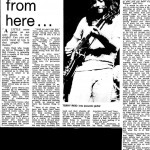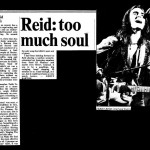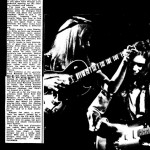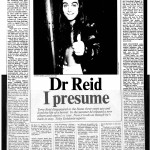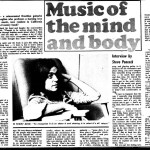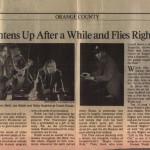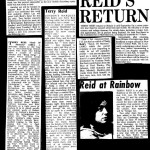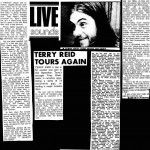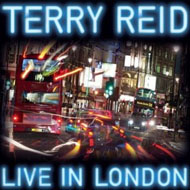Interviews
Old Newspaper Interviews/Reviews
Interview from Record Collector 1992
(indebted to Steve Toplek for taking the time to scan and mail this)
TERRY REID :
PETER DOGGETT TALKS TO ONE OF ROCK’S GREAT SURVIVORS
Terry Reid could have joined Led Zeppelin but he turned them down. He also rejected the chance to join Deep Purple. Crosby, Stills, Nash and Young recorded one of his longs for their “Deja Vu” album, then left it off at the last minute. For three years at the commercial peak of his career, he was tied up in legal wrangles, unable to record. His favourite album was doomed when the label went bankrupt just after it was released. His follow-up wasn’t promoted by the record company, and died another speedy death. After twelve years without a new release, his comeback single this spring was meant to be a cover of the Waterboy’s “Whole Of The Moon”. No sooner was the record pressed up, than the original version was reissued and reached No. 1. Even hardened rock stars have committed suicide over less. Yet the Terry Reid who arrived in London last month to promote his new album, “The Driver”, was far from terminally depressed. Bronzed as befits a man who who lived in the States for two decades, Terry is otherwise the archetypal early Seventies Brit-rocker , happiest with a pint in his hand, and a bunch of mates around to share a laugh. For someone who toured America as a headliner when he was eighteen, he is refreshingly down-to-earth, with none of the superstar pretensions that mar the idols of the video age. And he still has that voice – a throat searing instrument of white soul , every bit the match of Rod Stewart or Paul Rodgers, which turns his new single, “Fifth Of July”, into an epic power-ballad worthy of saturation airplay.
Reid was fifteen when he was discovered by Peter Jay (of Jaywalkers fame), and launched as Britain’s answer to the Atlantic soulmen . In 1966, he toured Britain supporting the Stones, a year later he made his first single, “The Hand Don’t Fit The Glove” , for Columbia. He then formed his own trio, playing virtuoso guitar in front of an organist and drummer, and was signed up by Mickie Most, to join a stable that already included the Jeff Beck Group, the Yardbirds and Donovan. Most first tried to groom Reid as a balladeer, with the Long John Baldry style “Better By Far”, then he introduced him to America. His first album, the US: only Bang Bang You’re Terry Reid”, was a poor showcase for his talents; it’s likely that Terry’s rather off key contributions were nothing more than guide vocals, never intended for release. But when Terry toured America behind Cream, he made a tremendous impact at the 1966 Miami Pop Festival, and recorded the acclaimed “Terry Reid” album (since reissued on See For Miles, repackaged with his first two singles), his future seemed assured. The decision not to join Led Zeppelin assumed importance only in retrospect. More vital was his deteriorating relationship with Mick, Most, which left his career stagnant for three years or more. In the meantime, he moved to California, returning briefly for another dynamic performance at the Glastonbury Festival in 1971, and fell in with the new generation of L.A. rock poets, from Jackson Browne to CSNY .When his legal problems were eventually solved, he issued the “River” album, one of the lost classics of the Seventies. As before, though, its glowing reviews weren’t translated into sales. And for the rest of the decade, Reid seemed-at least to the casual observer – to be following a Paul Simon-like pattern of leisure broken by occasional visits to the studio,for albums in 1976 and 1979. Since then, nothing-until the new album, with its mix of revivals (“Fifth Of July”, “Whole Of The Moon”) and new Reid material like “Right To The End”, “Hand Of Dimes” and “Turn Around”. Trevor Horn handled some of the production, while Terry produced four tracks himself; and Enya , Joe Walsh , Stewart Copeland, Howard Jones and Tim Schmidt were among the friends who helped out. Terry Reid inspires that kind of loyalty; and he still has a voice to kill for. We caught up with him on a rare visit to London, and asked him to explain his reasons for being cheerful after a career as the hapless plaything of ill-intentioned fate.
RC: You’ve gone down in the history books as the man who was asked to join Led Zeppelin, but had to turn them down, because Mickie Most had you under exclusive contract.
TR: That’s a load of bullshit! I was the one who put the group together. Jimmy Page offered me the job, but I had two tours of America booked up, so I had to say no. In the meantime, we were doing a gig-in Buxton, I think it was – with the Band Of Joy as support. I’d seen them before, and I knew Robert Plant and John Bonham . And when I watched them on stage, I thought, that’s it I could hear the whole thing in my head. So I phoned up Jimmy the next day and said, “I’ve found him, the singer”. And Jimmy said, “What does he look like ‘?” “Whaddya mean what does he look like’?”, I said. “He looks like a Greek God. I’m talking about how he sings! And the drummer is phenomenal Check it out!” So people keep saying “Terry found Robert”, but he weren’t lost. He took a bit of finding, but he weren’t lost!
RC: So there was no bitterness about missing out on joining Zeppelin ?
TR: No,. I’m the guy who put the greatest rock and roll band in the world together, and I’m proud of it. When you do something good, there’s always people gonna try and make something bad out of it. But it don’t bother me, mate I never got a penny out of it, but I should be bitter about that? No, I’m just proud.
I saw Robert Plant the last time I was over. He’ll do anything for you, God bless him. Its nice to see he got through all that alive. That’s all that matters to me. He made such a fuss of my little daughter-I mean, strewth, she wouldn’t leave! I said, we gotta go, but she wouldn’t go unless Robert came too’
RC: Not the first girl to to lose her heart to Robert Plant.
TR: Yeah, but at six years old! I said to Robert, I think we’ve been through this situation before!
RC: Back in 1965, you were apparently discovered by Peter Jay at the Palais in Peterborough.
TR: Was it 65? Bloody hell. Who with , that must have been the Rigbeats no, don’t laugh, they were a bloody good band.
RC: That was an R n B band?
TR: Ouch, no. We were a beat group-you should have even the suits! All the bands started out on the pub circuit, at places like the Racehorse , in Newmarket, where there were four or five different bars, with a different group in each. Big time. I look back and I wonder how much money they made on a night with four bars!
Anyway, the Palais was a skating rink. I went to see the Who there, a week after they changed their name from the High Numbers. I remember that the steel rails round the rink were the only thing that saved everybody from being hit by Keith’s drums when he kicked them all in the audience! That was the first time anybody had seen someone do that. It was like minnows coming out of a pike’s mouth when he kicked those drums, with everyone diving for cover.
RC : What music were you playing in those days?
TR: Beatles and R n B. It was just slightly before the soul band era. We got into that a bit later. Peter Jay was trying to design it on the basis of a soul band, instead of a show band like he had been. We did things like “Knock On Wood”- Joe Tex, wasn’t it?
RC: Eddie Floyd.
TR: Right, thank you. I was talking to my mate the other day in the States and we couldn’t figure out who did “Knock On Wood” – and he’s black!
RC: Was there one singer who was the big influence on you?
TR: No one in particular – except Otis, he creased us all, Paul Rodgers, Frankie Miller, Robert Palmer , Otis, and anyone who’s got his heart in it.
RC: When did you realise you had a voice, that you weren’t like, say Freddy Garrity?
TR: Freddy Garrity! I heard he weren’t doing too good last time around. My cousin went to see him and bloody asked for his money back! But he was great when he started.
RC: Did people come up to you and say, my God, you sing like Otis Redding?
TR: Nobody ever said that. I wish they had done. But I would’ve been stupid to believe it if they had !
RC: With that kind of soul background, what was it like working now with Trevor Horn, who has a reputation for big productions where the artist is like this little pawn in the corner?
TR: Ah, what a guy! We had our moments there. I wasn’t that aware of him beforehand; the only thing I knew was the Art Of Noise. This is the guy I’m working with? I said, I’m ready! That was like state of the art. Now he’s working with a bunch of guys, and they let him do whatever he wants , it’s like bloody World War Three !
If you’re gonna have a producer, then let him produce. Don’t tie his bloody hands behind his back. You ruin his direction, his train of thought. Trevor will sit with his eyes dosed for an hour, and listen to the same thing. Then he’ll go home, come back two hours later, and go: “I’ve got it!”. And he’ll put it all together, and it’ll be totally different. He’ll change the whole arrangement, the whole song, and when he’s finished, about two days later, you’ll listen to it and go, “You know what? He’s bloody right!” He’s a genius, but you’ll only find out he’s a genius by keeping your mouth shut and listening to him. I’m a singer, I’m not a bloody producer, and I know my place!
RC: Was Mickie Most a genius too?
TR: He was great to work with while we were working together. I have no animosity towards Mickie Most He got pissed off with me cos he wanted me to do things his way, and I said I didn’t want to do it . He said, “Well, you can’t do that”. I said, “I just did!” The trouble was,I didn’t know that Donovan had done exactly the some thing to him the day before! You can’t knock Mickie-all those records with the Animals , Herman’s Hermits, Donovan. But I don’t think he was right putting me into litigation for three years.
RC: Which is why there was the long gap before you issued “River”.
TB: You better believe it I could do gigs but I couldn’t make a record. But that doesn’ t mean to say I hate him . I kept saying to him. I wanna move on, do a different thing. And he said, “No, you will do what I want “. I’d just put another band together, with David Lindley and Alan White, and the sad thing was that we couldn’t record. Ahmet Ertegun of Atlantic was the one who turned around and said, look, that’s enough, and worked it out with Mickie. It took someone who was a real icon like that , a great musician, a genius. I was honoured to have the chance to work with him.
RC: Is it true that on your first American tours your father came along to keep the groupies at bay?
TR: No! He had the godforsaken task, when no-one else wanted it, of keeping order on tour. That bullshit is ridiculous about keeping groupies at bay. You think I couldn’t do that myself- if I wanted to .
It was pretty easy touring with Cream. The first tour with the Stones was the worst, when I was 15. Jesus, I’m still getting over that one! You try to get on with your life, and then after they’d screamed themselves silly, you had to try and get out with your life. Everyone says, it must have been wonderful with those women. But you could get killed!
On tour with Cream, I said to Eric Clapton, “What sort of stuff should I do, should I try to fit in with what you’re doing . We were both three-piece bands, though we sounded quite different. And everyone was telling me that I should be playing more blues. But I couldn’t get up there and sing, “I come from Mississippi/I’ve got no money”-I’m not from Mississippi, I’m from Cambridge!
RC: You moved to California around 1970,and fell in with Graham Nash?
TR: No, I’d known Graham since I was 14, when he was in the Hollies. Graham was the one who instigated that deal with Mickie Most. Oh man, he’s my idol, my mentor. One of the finest gentlemen in the business – Crosby, too, though people don’t understand him, ‘cas he’s too intelligent for them.
RC : Is it true that Crosby, Stills , Nash, and Young recorded one of your songs during the “Deja Vu” sessions?
TR: Yeah, how did you know about that? It was “Without Expression”. It got all messed up, though, because Stephen Stills didn’t want to put it out. He was short of a song on the LP, and so he wanted another of his put on instead. But they recorded it, I heard it. Graham’s got a tape of it. When he played it to me, you can imagine the shock of hearing them doing that, in four-part: harmony. I’m going, perhaps there is a God after all ! It sounded great, unbelievable.
I was in on the whole thing, from when Graham left the Hollies. They rehearsed up at Sag Harbor on Long Island, and Graham asked me up to watch them rehearse. They were doing “Blackbird” in the bathroom. I heard them, and said, “I’m quitting”! Graham said, “Oh, do you like it, then?”
RC: Between “River” on Atlantic and Seed Of Memory” on ABC, there was a three-year gap What were you doing?
TR: I was writing. I lived way up in the mountains in Ventura County. I lived on 180 acres with a 1,000.foot drop in front of the window. Dylan bought the whole property. He went in there with the cash and bought it. Garth Hudson was living there too. Bob bought the whole plateau up in the mountains, actually. It was old Indian burial grounds, so no one could build on it. There was just one big stone house up there, built by a steel tycoon in the 1920s, That was a great place to write, and that’s where I wrote the whole of “Seed Of Memory”.
RC: Which was produced by Graham Nash. I presume as a producer that he just let you get on with it?
TR: No! Graham was the leader of the Hollies
RC: And of your sessions too?
TR : Yeah. You should be so lucky as to have a leader like that! He’d ask me what I wanted to do, and I’d say, “What do you think?” He’d say, ‘Right. This is what we’re gonna do.” That’s the best thing to say to Graham, `cos if you say, “I wanna do this”, he’ll say, “Yes, but I want to try this first”! He’s a tough cookie. When he believes in something, there ain’t no shifting him. We did a track together at Christmas what a singer. I was trying to double up his vocal part, and I ran out of air I couldn’t hold the note as long as he could. I turned to him and said, “I suppose I’m fired from the Hollies, right’?” He cracked up!
RC: After “Seed Of Memory” there was another three-year gap.
TR: What happened was that the company, ABC/Dunhill, went down the tube. I didn’t see it coming. We had a deal whereby if they reneged on the agreement, I was supposed to get the budget for the next album. But when they went bankrupt, they froze all the assets. I didn’t come out with the cab fare. Graham gave me some of his own money just to get me back on my feet.
RC: Did you feel fated?
TR: No, it’s like they say: shit happens. I didn’t know the internal politics of the company. You’re supposed to find out what’s going on and get out before the ship sinks. To be honest, that did clip my wings for a bit, ‘cos I really loved that album To me, that was the ultimate, to work with Graham He said he was going to produce it, and he ended up bloody singing on everything. There was a point there when I was wondering whose bloody album it was! And then to see it all go down the tubes . . .Then there was a lull for a bit, before I signed with Capitol. I wanted to make a rock’n’roll album, and I asked for Chris Kimsey to produce it ; he was the Stones’ engineer on “Some Girls”. But Capitol was in a real mess – no-one there could make up their mind. They didn’t know if it was Shrove Tuesday or Sheffield Wednesday. So we did the album and they didn’t like it. They didn’t promote it, or do anything for it.
RC: That was around the time they rejected David Crosby’s solo album as well.
TR : Remember that house-cleaning at record companies? There was an economic crisis, supposedly, and they started firing everybody. You’d go in one day, and the building would be half empty. A couple of companies actually fired too many people by mistake and had to hire them back again! That’s when the busi nessmen said, look, this LA stuffs gotta go. The business is going back to New York.
So after Capitol I put a group together called Close Quarters. We did a few things, but we had more fun looning around than we did playing. At that point, after all that had happened, I just couldn’t be serious about the business. Then I got married, had two children, and I thought, now I’ve found something I can really get behind. I figured I’d never quite make it, so it wasn’t worth killing myself trying.
RC: So how did you end up on WEA this time around?
TR: Well, I’ve been making tapes for years, and sending them around. And Rob Dickens liked what he heard, and signed me up. But I’ll just take it as it comes. If it works this time, it works; if it doesn’t, then it won’t kill me!
Comstock Lode Issue No6 1979 Interview/Article by Paul Thoms
CL: Can we start with your first group, The Redbeats?
TR: I was about 13 and still at school; it was our school group. I was that age, but everyone else was a bit older, about 18 or 20. That was when we started playing and we played around the area and did a bunch of things. That was the first one.
CL: You played a gig with Peter Jay and the Jaywalkers; is that how you got into his group?
TR: Yes I played with Peter, we were away doing a gig at Peterborough (at the Palais), we got together and started talking about it. I just wanted to get on the road and play a lot because we were just doing gigs at home and I wanted to move out a bit. So he said ‘I want you to join the band’. So that was it and we did that for a while. About a couple of years.
CL: The only thing you recorded with him was ‘Hand Don’t Fit The Glove’?
TR: Yes.
CL: And then you formed a group with Eric Leese and Keith Webb.
TR: That’s right, and that’s the one we went to America with. I had been playing with Pete for a while and some people were leaving and some people were coming and going and I just felt like putting a group together of my own, because I had started writing myself, and had a lot of different things I wanted to do. So I put the group together and then the whole thing came together and we went to the States.
CL: When did you record your first album? Eric Leese wasn’t on it, was he?
TR: No, he left the band before we did an album. So we went to Pete Solley, he joined us just before we went to America. Peter joined us three days before we went; we jumped on it and put it together and toured with Cream.
CL: Did you go to the States to record ‘Bang Bang You’re Terry Reid’?
TR: No; we did it in London.
CL: It was never released here though.
TR: No, it was just done through One Stop records. CBS … I don’t know what happened there.
CL: Then you signed with Peter Grant. Is this why there are rumours that you were offered the job of lead singer with Led Zeppelin?
TR: Yes. You remember when all the bands were breaking up and reforming. Jimmy was putting a group together and I was with Peter with Rack Management. Peter Grant and Mickie Most were partners, so I signed with Most, in turn signing with Grant.
CL: Did you suggest Robert Plant for the group?
TR: I suggested Robert because I knew him a bit and I had seen him around and I thought he was just perfect for the group at that time. What Jimmy was up to doing and what he wanted to do seemed right there, that high intensive voice, it matched the solos and it matched the guitars. We did a tour with him when he was with The Yardbirds – Beck and Page were on guitars. I could see what Jimmy wanted to do, I saw what direction he wanted to take it. At the time I wanted to work on different things, I didn’t want to do it .
CL: You recorded a single ‘Better By Far’
TR: Things just got bloody bananas with that one, that was a whole trip. We were playing rock and roll, sweating our asses off in clubs doing all these street gigs, and Mickie wanted to do a suit presentation number. I said ‘You must be kidding. For a start you’re going to get this beautiful suit and I’m going to go on stage and by the time I come off it’s going to be ruined, it just isn’t on.’After that we did the albums and just belted off to America.
CL: How do you look back on those two early albums now?
TR: I like the tunes, I don’t like the production much. When we went to America we were a three piece group. Then we did a Stones tour and another guy joined me called Lee Miles he played bass and then after that I was in England and I put another band together with all, sorts of litigation and problems.
CL: Was this when Chesley Milligan managed you?
TR: He was a good lad, it wasn’t anything to do with Chesley, the litigation was another situation. We did a tour of the States and toured around England a lot with Alan White on drums, Chris on bass. It was a great band but we couldn’t record at first because of hassles with the previous record company.
CL: You went into the studio to record over here though.
TR: We started to do ‘River’, but the trouble was that he had all this litigation hanging over our heads and we didn’t know when it was going to come out. I was just working on tunes, and I then started to experiment. When we were in the studio we did a deal with Atlantic which cleared everything up and we signed a new contract. A lot of time had passed by then.
CL: How did you get into the film ‘Groupies’? (‘Groupies’ was an American film that came out in 1970. It was about the exploits of various American groupies such as Miss Harlow, Cythia P. Caster, Goldie Glitter, Lixie, Andrea Whips and Chaz, a 16 year old queen. It has music by Terry Reid, Spooky Tooth, Ten Years After and Joe Cocker.
TR: I didn’t really have much choice. I’d open my door to get my milk in the morning and these two, three guys would run in with this movie camera; that was how it was done, a very professional film was ‘Groupies’. We were hanging out in New York City and LA and they decided to make a film of what we were up to.
CL: Did you find it a bit of an embarrassment?
TR: It was kind of an embarrassment. They were shooting the whole thing and it was bound to be misread. There were a load of people in SF at that time who’d been taking a lot of different drugs and they were spaced out people who were quite different from people who were around anywhere else at that time. After going there a lot you’d get to know them all and everybody would hang out, you’d take everybody as everybody.
CL: Where did you meet David Lindley?
TR: David and I met at the Sky River Rock Festival which was held in Washington State; he was playing with Kaleidoscope at the time. Then he wrote me a letter saying he would like to get together and play. So I wrote back and said ‘Get on over here’ and that’s what he did – he jumped on a plane with all his guitars and we based the band in
England. Lee came too.
CL: What about Lindley’s green wellies.
TR: He’s still got them, he won’t part with them. With his lambswool socks over the top – milking boots.
CL: Tell us about the night he got laid out on scrumpy.
TR: It was terrible. It wasn’t just the scrumpy, he was drinking it with guinness. I said ‘Just don’t light a match, we’ll have an explosion!. We had to take him to hospital.
CL: What about the samurai movies you and David go and see?
TR: At the Toho La Player. David’s really into them. He collects those swords. We went to a porno one, that was great.
CL: What about when you and David play McCabes?
TR: We tell Irish and Scottish jokes half the evening. It’s a really small place and everyone’s just sitting around, so you get talking to the audience. We rehearse about 6 or 7 songs and ad-lib the rest. It’s the kind of thing I like doing as well as putting a record out.
CL: Where did you meet Lee Miles?
TR: I met Lee with Ike and Tina Turner.
CL: In 1970 you didn’t do many gigs, you just went into a cottage and rehearsed with the group didn’t you?
TR: I was just working on things, that was when all that litigation was going down which slowed it up a bit. Then we put the group together with David. After that all cleared up we did ‘River’. I decided to re-cut a lot of it in the States I wasn’t all that happy with it, so ‘I changed a lot of it. CL: ‘Dream’ and ‘Milestones’ were the only tracks you used from the ones cut in this country?
TR: That’s right.
CL: How did you get to play at Mick Jagger’s wedding?
TR: That was a loon. They asked me. I was playing down at The Marquee and someone came down and said Mick wanted us to do the wedding. I said ‘When is it’ and he said ‘We’ve got to leave tomorrow’.We jumped on the plane, flew out there, took a bus down to St. Tropez and of course everyone was there at the hotel, it was just nuts, great party. Everybody got up and jammed, Stills, Ronnie Wood, all going bananas.
CL: David Lindley said that there was at least four albums worth of material left over from the ‘River’ sessions.
TR: There was a lot of material left over. David and I still play together; we’ve been doing some gigs in LA. I’d love to do an album with David some time, just me and him.
CL: He’s always talking about doing his own album.
TR: He’ll do one – he’s got material all over the place.
CL: You were playing a lot here in ’73, including a gig at The Rainbow …
TR: The Rainbow gig just didn’t happen, all the gear blew up. I couldn’t hear anything, the monitors blew up, it was a total disaster.
CL: What were you doing in the three year gap between ‘River’ and ‘Seed Of Memory’?
TR: I was just doing various gigs, checking out different studios. Just before we did ‘Seed Of Memory’ I changed record companies and went with ABC. ‘Seed Of Memory’ was basically my and Graham Nash’s project. I had the songs and played them to Graham; he liked them and said I should do an album. Everybody wanted me to do a rock and roll album. It s a very personal album.
CL: How did it sell in the States?
TR: It didn’t sell a lot, basically because ABC didn’t promote it. We had a lot of air play on it and we get a lot of air play now, but they didn’t go full hog for it. There were so many changes going on in the company, it was hard to tell what they were going to do with anything. So I ended up leaving the company.
CL: And it was at this time that you were living in Oxnard in a Chicano community?
TR: It was very different from England. A lot of Mexican farm people and workers. I didn’t live in the town, I lived on the beach. People come from all over to live on the beaches. This was about 60 miles outside LA. L!’s alright, but I don’t like living in the city that much. You’ve no room to move around. It’s nice where I live, it takes an hour to drive into town – that’s in Ventura, I’ve got a house on the beach there.CL: After ‘Seed Of Memory’ you went out on the road touring Who was in the band at this time?
TR: There was a creole called Soko Richardson, who was with Ike and Tina Turner, and there were two of the Ikettes -Lee Miles on bass and Doug Rodrigues on guitar. Half the band was out of Tina’s band, and that went into the whole thing. We were doing gigs in the States with girl singers and it was great. The trouble was that I got messed around by the troubles with ABC and the band couldn’t hang around forever while we got things organised.
CL: What about ‘Rogue Waves’?
TR: Lee Miles was still working with me, and we got a four piece rock and roll band together and decided to do the album just using those people. We did all the songs that I had with this rock and roll band and it was quite good, but there were not that many thrills on it. We cut all the album live in the studio.
CL: No overdubs?
TR: No vocal overdubs at all, all the lead vocals were done live, except for a few three-part harmonies.
CL: What are your plans for the future?
TR: I’ve got a whole bunch of new material I’m going to start recording when I get back. I’m fed up with resting and I want to get this next album recorded soon.
CL: How’s it working out with Capitol?
TR: I like working with them. Since I’ve been here they’ve been real helpful. We’re talking about going to Japan this next year. But when you start going to Japan and you start coming here you’ve got a lot of distance – not just the distance in miles but the distance in people. The music’s always the same but everything feels different.
CL: Why did you include the cover versions on ‘Rogue Waves’?
TR: I did a few covers on that album just because I just wanted to do a bunch of those old songs. For the next album I’ve got a lot of material and I think I’m going to do all my own material again.
CL: Would you like a hit single?
TR: Yeah, it would be great. It would intensify the whole thing and the recognition of being able to do what I want to do.

